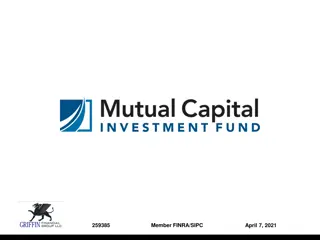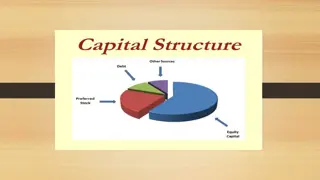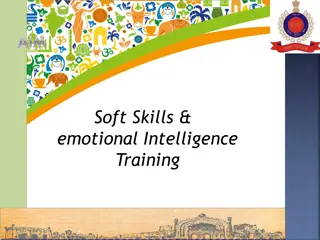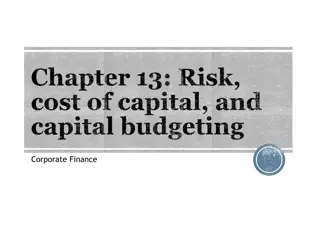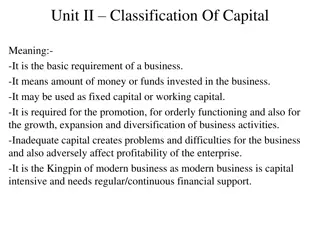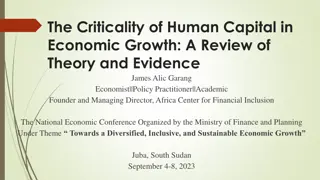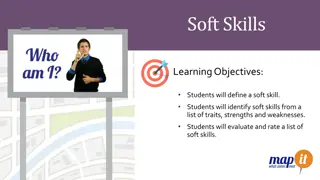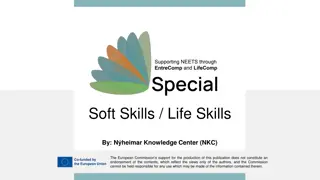Developing Your Human Capital: The Power of Soft Skills
In today's competitive job market, the importance of soft skills in developing human capital cannot be overstated. Building attributes like communication, teamwork, and adaptability can significantly impact career success and personal growth. Investing in oneself through education and personal development enhances job opportunities and income. Emphasizing on human capital and soft skills is crucial for individuals aiming to excel in their chosen fields.
Download Presentation

Please find below an Image/Link to download the presentation.
The content on the website is provided AS IS for your information and personal use only. It may not be sold, licensed, or shared on other websites without obtaining consent from the author.If you encounter any issues during the download, it is possible that the publisher has removed the file from their server.
You are allowed to download the files provided on this website for personal or commercial use, subject to the condition that they are used lawfully. All files are the property of their respective owners.
The content on the website is provided AS IS for your information and personal use only. It may not be sold, licensed, or shared on other websites without obtaining consent from the author.
E N D
Presentation Transcript
Developing Your Human Capital The Importance of Soft Skills Developing Your Human Capital Soft Skills
Discussion Prompt You are invited by a potential employer to have coffee. You have never met before, but the discussion will center on possibly hiring you for the job of your dreams. What will you do to make the impression necessary to land the job? Spend five minutes at your desk writing down the steps in preparation you would take and the skills and behaviors you would exhibit during the interview. Developing Your Human Capital Soft Skills
Labor Market Income for most people is determined by the market value of their labor, paid as wages and salaries. Developing Your Human Capital Soft Skills
Personal Development People can increase their income and job opportunities by choosing to acquire more education, work experience, and job skills. Developing Your Human Capital Soft Skills
Human Capital This important economic term refers to the knowledge, skills, and health that individuals possess. Developing Your Human Capital Soft Skills
Human Capital Developing human capital is a form of investing: investing in oneself. Developing Your Human Capital Soft Skills
Human Capital / Opportunity Cost In devoting time, effort, and perhaps money to education, students give something up now in order to gain something of value in the future. Developing Your Human Capital Soft Skills
Investing In Yourself Traditionally, it s been believed that education is one of the safest and highest value investments around. Developing Your Human Capital Soft Skills
Is More Education Worth The Cost? Developing Your Human Capital Soft Skills
Human Capital Much emphasis is placed on developing the technical elements and specialist knowledge (Hard Skills) Little attention is paid to developing intangible talents and intuition (Soft Skills) Developing Your Human Capital Soft Skills
HARD SKILLS SOFT SKILLS Specific, teachable abilities that can be defined and measured Often listed on a job applicant's cover letter and resume Examples could include fluency in a 2nd language, software proficiency, machine operation ability Personality-oriented interpersonal skills, such as teamwork, flexibility, willingness to give extra and communication skills They aren't learned through a defined instructional path; soft skills are often learned by trial and error. Developing Your Human Capital Soft Skills
Seven Soft Skills Employers Seek Leadership Skills Teamwork Communication Skills Problem Solving Skills Work Ethic Flexibility/Adaptability Interpersonal Skills Because employers have an easier time teaching new hires hard skills, employers often look for job applicants with specific soft skills instead. Developing Your Human Capital Soft Skills
Attributes Admired Intangible Skills Important To Employers Leadership Ability to work in a team Communication skills (written) Problem-solving skills Communication skills (verbal) Strong work ethic Initiative 80.1% 78.9% 70.2% 70.2% 68.9% 68.9% 65.8% Source: Job Outlook 2016, a survey conducted by the National Association of Colleges and Employees (NACE) Developing Your Human Capital Soft Skills
Key Soft Skills Leadership Skills: cultivate relationships and build teams Teamwork: understand the value of joining forces Communication Skills: Verbal, Non-Verbal, Aural, Written and Visual Developing Your Human Capital Soft Skills
Key Soft Skills Problem Solving: find answers and workable solutions, take on problems don t avoid them Work Ethic: self-starter, punctual, meet deadlines, thorough, go the extra mile , be responsible Developing Your Human Capital Soft Skills
Key Soft Skills Flexible/Adaptable: wear multiple hats , respond to change well Interpersonal Skills: maintain relationships, develop rapport, use diplomacy Developing Your Human Capital Soft Skills






